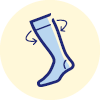- Home
- Breast cancer
- Treatment
- Surgery
- What to expect after breast surgery
What to expect after breast surgery
If you have any questions about your recovery and how best to look after yourself when you get home, ask the doctors and nurses caring for you. If you are referred to a breast care nurse, they can give you information about what to expect after surgery and provide support.
Your hospital stay will depend on the surgery you have and how well you recover.
Breast-conserving surgery – You usually go home that day, or stay overnight.
Mastectomy – You usually stay in hospital overnight.
Reconstruction after mastectomy – You usually stay in hospital for several days.
What to expect after surgery
Dressing and tubesA dressing will cover the wound to keep it clean. This may be changed while in hospital but is usually removed after about a week. You may have one or more drainage tubes to drain fluid from the surgical site into a bag. These can stay in for 1–2 weeks. Nurses will show you how to look after the drains and wound at home, or a community nurse or GP may help you.A wound infection can happen at any time. If you have any redness, pain, heat, fever, swelling or wound discharge let your doctor, breast care nurse or surgeon know right away. You may need antibiotics to manage the infection. | |
Recovery timeThe time it takes to recover from breast surgery will depend on the type of surgery you’ve had and your own health. You may feel better after a few days, or it may take a few weeks or longer if you have a mastectomy with a reconstruction. | |
Pain reliefPain after an axillary lymph node dissection or a mastectomy is more likely than after breast-conserving surgery. You’ll have pain relief through a drip (intravenous or IV), an injection or as tablets. You’ll also be given pain medicine when you go home. | |
 | Preventing blood clotsWhile in bed, you should try to do some deep breathing exercises, and move your legs around to help prevent blood clots in the deep veins of your legs (deep vein thrombosis or DVT). As soon as you’re able, you’ll be asked to get up and walk around.You may wear elastic (compression) stockings or use other devices to help prevent clots. Your doctor might also prescribe medicine that lessens the risk of any blood clots forming. |
Avoid cutsYour treatment team may advise you to wait for a time if you want to shave or wax your armpits. | |
 | Shower carefullyKeep the wound clean and gently pat it dry after showering. Avoid baths. |
MoisturiseGently massage the area with moisturiser once any stitches or adhesive strips are removed and the wound has completely healed. | |
Don’t use deodorantIf the wound is under your arm, avoid using deodorant until it has completely healed. |
→ READ MORE: What your breast looks like after surgery
Podcast: Coping with a Cancer Diagnosis
Listen to more of our podcast for people affected by cancer
More resources
A/Prof Elisabeth Elder, Specialist Breast Surgeon, Westmead Breast Cancer Institute and The University of Sydney, NSW; Collette Butler, Clinical Nurse Consultant and McGrath Breast Care Nurse, Cancer Support Centre, Launceston, TAS; Tania Cercone, Consumer; Kate Cox, 13 11 20 Consultant, Cancer Council SA; Dr Marcus Dreosti, Radiation Oncologist and Medical Director, GenesisCare, SA; Dr Susan Fraser, Breast Physician, Cairns Hospital and Marlin Coast Surgery Cairns, QLD; Dr Hilda High, Genetic Oncologist, Sydney Cancer Genetics, NSW; Prof David W Kissane AC, Chair of Palliative Medicine Research, The University of Notre Dame Australia, and St Vincent’s Hospital Sydney, NSW; Prof Sherene Loi, Medical Oncologist, Peter MacCallum Cancer Centre, VIC; Dr W Kevin Patterson, Medical Oncologist, Adelaide Oncology and Haematology, SA; Angela Thomas, Consumer; Iwa Yeung, Physiotherapist, Princess Alexandra Hospital, QLD.
View the Cancer Council NSW editorial policy.
View all publications or call 13 11 20 for free printed copies.



